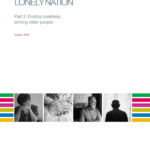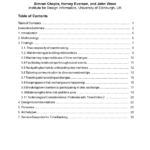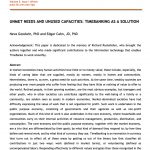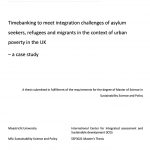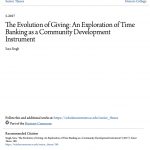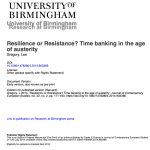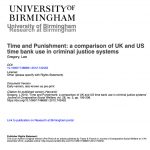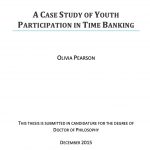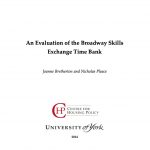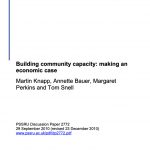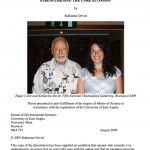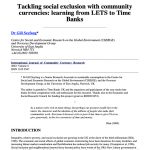A selection of research by academics and practitioners into the value and practice of timebanking. Please email us if you know of other useful research we can add to this list.
Lonely nation: Ending loneliness among older people
The Centre for Social Justice
The Centre for Social Justice (CSJ) report, Lonely Nation Part 2: Ending Loneliness Among Older People (August 2024), examines the root causes of loneliness in older adults and provides policy recommendations to tackle it. The study identifies public transport, digital exclusion, and housing as immediate barriers to social inclusion, while family structures, intergenerational engagement, and retirement transitions present long-term challenges. The report highlights that 5.8 million people over 65 feel lonely at least some of the time, with economic and health costs associated with this isolation. It advocates for community-driven solutions, government support, and innovative models of engagement, including volunteering schemes and social prescribing.
A compelling example of such a solution is timebanking, discussed on page 46. Timebanking enables people to exchange time-based credits for services, fostering community support and reducing isolation. Notably, it allows distant family members to volunteer and transfer earned credits to their older relatives, who can then redeem them for local assistance. This mutual aid model strengthens social bonds and provides a practical, scalable solution for loneliness.
If you are interested in real-world applications of community-led solutions, we strongly recommend reading the timebanking case study on page 46.
Understanding the potential role of digital
technology in time banks: A qualitative study
Simran Chopra, Harvey Everson, and John Vines
Institute for Design Informatics, University of Edinburgh, UK
2025
Utilising Machine Learning for Better
Mental Health and Decision Making: A
Case Study of Timebanking UK
Alaa MOHASSEB, Fatima CHIROMA, Rinat KHUSAINOV and Richard CURRY
School of Computing, University of Portsmouth, UK
October 2024
Imagine a future where technology enhances community connections and improves lives. Research, in collaboration with Timebanking UK, is exploring how innovations like machine learning and predictive analytics could transform service matching, streamline operations, and foster social well-being. By studying tools like natural language processing and synthetic data generation, this research is paving the way for smarter, more inclusive community engagement in the years to come.
Sharing Time: A Global Tribute to UK Timebanking
ASOCIACION IBEROAMERICANA
DE BANCOS DE TIEMPO
2024
“What is at stake with time banks — as exercises in the ‘economy of favors,’ as defined in Spain, or alternative transformative collaborative economies, or any other adjective used to describe a time-based exchange mechanism — is breaking the illusion that only money can generate wealth.”
– Humberto Salazar, Asociacion Ibero-Americana de Bancos de Tiempo (ASIBDT)
This powerful insight is shared in the 4TH WORLD REPORT OF TIME BANKS, published by ASIBDT to celebrate 25 years of British Time Banks.
Unmet Needs and Unused Capacities: Timebanking as a Solution
Neva Goodwin & Edgar Cahn
2018
The core economy and the public purpose economy, together with the market economy, are a trio that are differentiated by their goals; by what kind of demand they respond to; by how they define and reward work; and by what kind of currency they use.
Timebanking to Meet Integration Challenges of Asylum Seekers, Refugees and Migrants in the Context of Urban Poverty in the UK
Carina Skropke
August 2018
The study explores how timebanking can contribute to the integration and assimilation of asylum seekers, refugees and migrants in the context of urban poverty in the UK. It draws on empirical evidence from a case study of the Hull and East Riding time bank.
The Evolution of Giving: An Exploration of Time Banking as a Community Development Instrument
Sara Singh
May 2017
The central assertion of this paper is that if timebanking processes are good, people will make it work because they have so much to gain and little to lose.
The Time Bank Solution
Edgar Cahn & Christine Gray
Summer 2015
People engage in timebanking in dozens of countries worldwide. For decades, it has been a relatively small-scale movement. But signs are emerging that it may be an idea whose time has come.
Resilience or Resistance? Time Banking in the Age of Austerity
Lee Gregory
April 2018
This paper explores how timebanking was promoted by the UK coalition government within the Big Society programme and social care reform.
Time and Punishment: A Comparison of UK and US Time Bank Use in Criminal Justice Systems
Lee Gregory
April 2015
This paper explores two developments in the relationship between time banks and the criminal justice system: the Time Dollar Youth Court established in the US, and an initiative involving a UK time bank and a prison.
Introduction to Time Banking and Time Credits
Dr Sanna Markkanen & Dr Gemma Burgess
October 2015
The aim of this evaluation of the public health outcomes of the Cambridgeshire Time Credits project in Wisbech is to determine its potential to tackle social exclusion, loneliness and deprivation and to assess the extent to which it can reduce health inequalities.
Co-producing the School? A Case Study of Youth Participation in Timebanking
Olivia Pearson
December 2015
This thesis reports on a multi-method, qualitative case study into the implementation of timebanking in a Welsh secondary school.
An Evaluation of the Broadway Skills Exchange Time Bank
Joanne Bretherton & Nicholas Pleace
2014
The overall aim of the research was to evaluate the extent to which the Broadway Time Bank met its aims and objectives of increased employability through skills development, work experience and increased confidence and self–esteem; supporting people into employment or self-employment and increasing positive involvement in the local community.
Evaluation of the Cambridgeshire Timebanks
Gemma Burgess
January 2014
This study evaluates the outputs and outcomes of four Cambridgeshire timebanks. It is exploring what impacts they have on individuals and communities, and, in particular, whether they can generate public cost savings.
Improving Health through Participation: Time Banks as a Site for Co-Production
Lee Gregory
September 2012
This research examines the relationship between timebanking and co-production within health care.
Building Community Capacity: Making an Economic Case
Martin Knapp, Annette Bauer, Margaret Perkins & Tom Snell
September 2010
This report explores whether it’s possible to deploy available individual, community and public resources in different ways and combinations to achieve better outcomes.
Defining a Framework for Sustainable Time Banking to Assist Developing and Established Time Banks in Strengthening the Core Economy
Katharine Devitt
April 2009
There is a lack of statistical data to inform strategies that can help time banks to create sustainable social networks, receive sufficient funding and remain active within a community. This report presents results from a qualitative questionnaire, distributed to active time banks in the UK in 2007, and uses analysis to create a recommendation framework for sustainable timebanking.
Tackling Social Exclusion with Community Currencies: Learning from LETS to Time Banks
Gill Sefang
2002
In this paper, Gill Sefang explores the journey of skill-sharing, asset-based mechanisms in the UK and looks at factors such as what motivates people to join time banks, and how time banks acts as a means of informal support for those who may not have access to informal networks of support.


